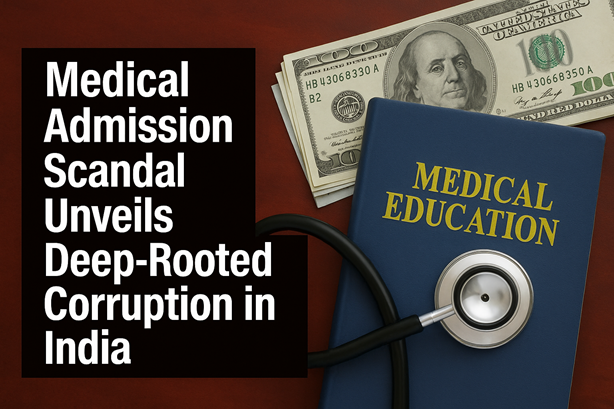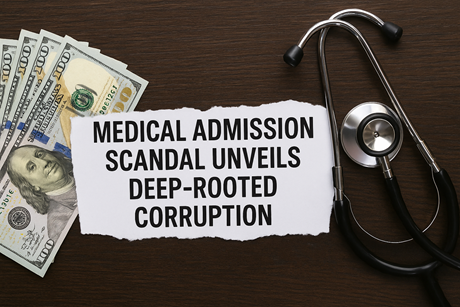The CBI’s investigation into the Rawatpura Sarkar University scandal has exposed a deeply entrenched network of corruption that threatens the credibility of India’s medical education system and Medical Admissions.
In a seismic development that has sent shockwaves through India’s medical education sector, the Central Bureau of Investigation (CBI) has uncovered what it describes as one of the largest scams in the country’s history, implicating senior officials, prominent educationists, and a self-styled godman, Ravishankar Maharaj, popularly known as Rawatpura Sarkar. At the heart of this sprawling scandal is the Shri Rawatpura Sarkar Institute of Medical Sciences and Research (SRIMSR) in Nava Raipur, Chhattisgarh, run by the Rawatpura Sarkar Lok Kalyan Trust. The CBI’s investigation, which began with a seemingly routine bribery case, has ballooned into a nationwide probe exposing systemic corruption, fraudulent inspections, and manipulated regulatory approvals across multiple states, threatening the integrity of India’s medical education system and raising serious concerns about the future of healthcare in the country.
The Genesis of the Scandal
The CBI’s investigation was triggered in late June 2025, following credible intelligence about corrupt practices at SRIMSR. On June 26, Mayur Raval, registrar of Geetanjali University in Udaipur, allegedly informed Atul Kumar Tiwari, a director at SRIMSR, about an upcoming National Medical Commission (NMC) inspection scheduled for June 30. Raval reportedly demanded a bribe of Rs 25–30 lakh and disclosed the identities of the four-member inspection team, enabling SRIMSR to prepare for the visit by orchestrating fraudulent arrangements.
The CBI, acting on this tip, laid a trap and apprehended six individuals, including three doctors, in Bengaluru on July 1, while they were transacting a bribe of Rs 55 lakh to secure a favorable inspection report for SRIMSR. The agency recovered Rs 38.38 lakh from an aide of the inspection team head, Manjappa C N of Mandya Institute of Medical Sciences, and Rs 16.62 lakh from another official’s residence, with the funds allegedly routed through hawala channels.
What began as a localized sting operation quickly unraveled into a nationwide scandal. The CBI filed a First Information Report (FIR) on July 5, naming 35 individuals, including high-profile figures such as former University Grants Commission (UGC) Chairman and current Tata Institute of Social Sciences (TISS) Chancellor DP Singh, self-styled godman Rawatpura Sarkar, Suresh Singh Bhadoria of Indore’s Index Medical College, and retired Indian Forest Service (IFS) officer Sanjay Shukla, a trustee of the Rawatpura group and former chairman of the Chhattisgarh Real Estate Regulatory Authority (RERA).
The FIR also implicated eight officials from the Union Ministry of Health and Family Welfare, a National Health Authority official, and Jitu Lal Meena, a former member of the NMC’s Medical Assessment and Rating Board (MARB), accusing them of orchestrating a sophisticated network of bribery, document manipulation, and regulatory interference across six states: Chhattisgarh, Madhya Pradesh, Rajasthan, Uttar Pradesh, Karnataka, and Delhi.
***

Medical Admission: The Mechanics of the Scam
The CBI’s findings paint a disturbing picture of systemic corruption within India’s medical education regulatory framework. The scam revolved around manipulating the NMC’s inspection process, which is designed to ensure that medical colleges meet stringent standards for infrastructure, faculty, and patient care before receiving recognition or approval for additional seats. According to the CBI, officials within the Health Ministry and NMC, in collusion with middlemen and private college representatives, engaged in “egregious” acts of corruption, including leaking confidential inspection schedules, fabricating faculty rosters, and falsifying patient records to deceive assessors.
At SRIMSR, the CBI uncovered evidence that the institute failed to meet several mandatory government parameters, such as adequate infrastructure and qualified faculty. To circumvent these deficiencies, officials allegedly arranged for “ghost faculty”—individuals hired temporarily to pose as permanent staff during inspections—and even paid people to act as fictitious patients to artificially inflate hospital operations.
Biometric attendance systems were rigged using cloned samples to project compliance, and fake experience certificates were issued to bolster the credentials of proxy faculty. The CBI alleges that SRIMSR’s chairman, Rawatpura Sarkar, and director Atul Kumar Tiwari were central to these efforts, with Tiwari being the only individual arrested so far in connection with the case.
The investigation also exposed a parallel operation at Index Medical College in Indore, where Suresh Singh Bhadoria, a native of Lahar in Madhya Pradesh’s Bhind district like Rawatpura Sarkar, allegedly ran a similar racket. The CBI suspects that Bhadoria and Rawatpura Sarkar formed a powerful nexus, charging private medical colleges Rs 3–5 crore to guarantee NMC recognition, regardless of merit or infrastructure.
This network extended to colleges across multiple states, with agents like B Hari Prasad in Andhra Pradesh, Ankam Rambabu in Hyderabad, and Krishna Kishore in Visakhapatnam arranging dummy faculty and fake patients for inspections. In one particularly shocking revelation, the CBI discovered that Jitu Lal Meena allegedly used a portion of the illicit funds to construct a Hanuman temple in Rajasthan at a cost of Rs 75 lakh, highlighting the brazen misuse of bribe money.
***
Rawatpura Sarkar: The Controversial Godman
The inclusion of Rawatpura Sarkar, also known as Ravishankar Maharaj, in the FIR has drawn significant attention due to his extensive influence and connections with top politicians, ministers, and bureaucrats across Madhya Pradesh and Chhattisgarh. Born on July 12, 1968, in Chipri village, Tikamgarh district, Madhya Pradesh, Maharaj left home at age 11 to pursue a spiritual journey, eventually establishing Rawatpur Dham near a Hanuman temple in Rawatpura village, Bhind. His Rawatpura Sarkar Lok Kalyan Trust, founded in 2000, oversees a vast network of educational and healthcare institutions, including schools, engineering and management colleges, nursing and pharmacy schools, blood banks, hospitals, and the SRIMSR in Raipur.
Despite his spiritual persona, Rawatpura Sarkar is no stranger to controversy. His trust has faced allegations of land encroachments, operating unapproved colleges, coercing students into religious participation, and mentally harassing female followers in ashrams. Human rights commissions have investigated these claims, but few cases reached formal prosecution until the current CBI probe.
Social media has been abuzz with photographs of Rawatpura Sarkar alongside IAS and IPS officers, as well as prominent politicians from both the ruling Bharatiya Janata Party (BJP) and the opposition Congress, earning him the moniker “Baba close to power.” On July 5, just days after the CBI arrests, Rawatpura Sarkar attended an event in Sagar, Madhya Pradesh, for the unveiling of a Shiva idol, where top BJP leaders were present, though Chief Minister Mohan Yadav reportedly skipped the event following the FIR news.
***
A Nationwide Network of Corruption
The CBI’s raids, conducted across more than 40 locations in six states, have revealed the staggering scale of the scam. Investigators uncovered evidence of hawala channels and formal banking routes used to funnel bribes, as well as WhatsApp messages and covert communications containing leaked NMC inspection schedules and internal Health Ministry documents. The FIR alleges that eight Health Ministry officials, including Anup Jaiswal, Poonam Meena, Dharamvir, Deepak, Manisha, Rahul Shrivastava, and Chandan Kumar, were involved in gathering and disseminating classified information to college representatives in exchange for hefty bribes.
The probe has also implicated other institutions, such as Geetanjali University in Udaipur and multiple colleges in Andhra Pradesh, Telangana, and Rajasthan. The CBI estimates that over 40 medical colleges across India may have secured recognition through fraudulent means, raising alarm about the quality of medical education and its implications for public health. A recent report by The Lancet, published on July 19, 2025, underscored these concerns, criticizing the NMC for mirroring the opaque practices of its predecessor, the Medical Council of India (MCI). The report highlighted how private medical colleges, charging fees as high as Rs 20 lakh annually, exploit weak oversight to falsify hospital operations and faculty rosters, often hiring proxy faculty and staging fake patients on inspection days.
In response, the NMC announced on July 14 that it would blacklist four assessors and deny seat renewals for six colleges for the 2025–26 academic year. However, critics argue that these measures are insufficient to address the systemic rot. Dr. Abhay Shukla, national co-convenor of Jan Swasthya Abhiyan, noted, “Private medical colleges prioritize profit, undermining public health,” while Professor Mavlankar added, “NMC’s norms are not easily measurable, enabling corruption.”
***
Legal and Social Implications
The CBI has registered cases under multiple sections of the Bharatiya Nyaya Sanhita (BNS) and the Prevention of Corruption Act, with ongoing raids and interrogations expected to yield further arrests. The scandal has sparked widespread outrage, with experts and activists calling for urgent reforms to restore integrity to India’s medical education system. The involvement of high-profile figures and the scale of the fraud have raised questions about the influence of powerful individuals like Rawatpura Sarkar and the complicity of regulatory bodies.
Public health professionals warn that the proliferation of substandard medical colleges could have dire consequences for India’s healthcare system, producing underqualified doctors and compromising patient care. With India’s health expenditure at just 1.5% of GDP—well below the global average of 2.5%—the reliance on private institutions has grown, making robust regulation all the more critical.
| Sl. No. | Fact | Details |
|---|---|---|
| 1 | Name of Case | Rawatpura Sarkar University Medical Admission Scam |
| 2 | Investigating Agency | Central Bureau of Investigation (CBI) |
| 3 | Trigger Date | June 26, 2025 – Bribery tip-off before NMC inspection |
| 4 | Key Accused | Ravishankar Maharaj (Rawatpura Sarkar), Atul Kumar Tiwari (Director, SRIMSR), Suresh Singh Bhadoria (Index Medical College) |
| 5 | Key Institution Involved | Shri Rawatpura Sarkar Institute of Medical Sciences and Research (SRIMSR), Nava Raipur, Chhattisgarh |
| 6 | CBI FIR Filed | July 5, 2025 – Named 35 individuals |
| 7 | States Involved | Chhattisgarh, MP, Rajasthan, UP, Karnataka, Delhi |
| 8 | Bribe Amount Seized | ₹55 lakh involved; ₹38.38 lakh seized from inspection team aide; ₹16.62 lakh from residence |
| 9 | Regulatory Bodies Implicated | National Medical Commission (NMC), Union Health Ministry |
| 10 | Fake Practices Detected | Ghost faculty, paid fake patients, cloned biometrics, fake certificates |
| 11 | Arrests Made | 6 arrested in Bengaluru on July 1; Tiwari is in custody |
| 12 | Major Political Figure Involved | Rawatpura Sarkar – linked with BJP and Congress leaders |
| 13 | Religious Trust Involved | Rawatpura Sarkar Lok Kalyan Trust |
| 14 | Religious Fund Misuse | ₹75 lakh allegedly used to build a Hanuman temple from bribe money |
| 15 | Additional Accused | Ex-UGC Chairman DP Singh, former RERA Chairman Sanjay Shukla, ex-NMC MARB member Jitu Lal Meena |
| 16 | Ministry Officials Implicated | 8 from Union Health Ministry, including Anup Jaiswal, Poonam Meena |
| 17 | Associated Universities | Geetanjali University (Udaipur), Index Medical College (Indore), others in AP, Telangana |
| 18 | Extent of Scam | Over 40 colleges may have secured seats fraudulently |
| 19 | Medical College Bribe Rate | ₹3–5 crore for NMC approval |
| 20 | Communication Mode | Leaked schedules via WhatsApp, internal ministry docs, hawala channels |
| 21 | NMC Action Taken | 4 assessors blacklisted; 6 colleges denied seat renewal (2025–26) |
| 22 | Expert Reaction | Dr. Abhay Shukla: “Private medical colleges prioritize profit”; Prof. Mavlankar: “NMC norms hard to monitor” |
| 23 | Legal Framework | Cases under Bharatiya Nyaya Sanhita (BNS) and Prevention of Corruption Act |
| 24 | Public Health Impact | Risk of underqualified doctors; compromised healthcare |
| 25 | India’s Health Expenditure | 1.5% of GDP (below global avg. of 2.5%) – rising reliance on private colleges |
(India CSR)







